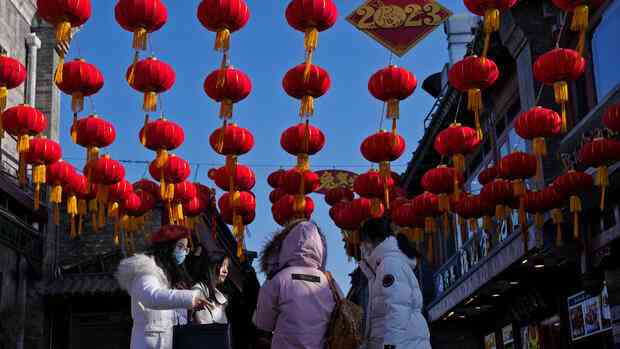The country is trying to open up after the tough corona measures.
(Photo: AP)
Dusseldorf Even after the end of the zero Covid restrictions, the risks for the Chinese economy and politics remain high. In a survey by the China Institute Merics, the results of which were previously available to the Handelsblatt, 880 China experts are primarily skeptical about developments in the world’s second largest economy.
Among the main challenges they cite the instability of the real estate sector and the further development of the Covid policy. The observers also count excessive government intervention in the economy and an end to access to key technologies from abroad among the risks. In addition, there is an impending global recession for foreign trade.
China’s Vice Premier Liu He, who is responsible for economy and finance, said at the World Economic Forum in Davos on Tuesday that China’s growth will return to “the normal trend” this year. Corporate investments and consumption would ensure this above all. However, Liu acknowledged that there are still risks in the real estate sector.
According to Chinese information, gross domestic product rose by three percent last year – the second lowest value in decades after the Covid year 2020.
Top jobs of the day
Find the best jobs now and
be notified by email.
Liu plans to meet US Treasury Secretary Janet Yellen in Zurich today, Wednesday. He advertised in Davos that China would push ahead with “economic re-globalization”. Above all, Yellen expects China to become more involved in the debt restructuring of distressed poor countries.
>> Read also: China is clearly missing the growth target it has set itself
After the country opened up to Corona, Chinese politicians are trying to improve relations around the world in a kind of charm offensive. Last year, the USA imposed strict restrictions on the export of technology to China. For some Chinese companies, this has become a problem due to a lack of semiconductor deliveries or the lack of access to machines that produce chips.
China experts expect an economic disentanglement between China and Europe
Relations between the US and the EU and Beijing’s leadership had recently suffered from China’s attitude in the Ukraine war. The majority of China observers in the Merics survey are convinced that little will change here.
Merics boss Mikko Huotari therefore warned with a view to European-Chinese relations: “A possible charm offensive from China will not change anything about the fundamental course that Beijing has taken.” The European Union (EU) must define which borders, for example for sensitive technology integration with China. “The question of which course the most important alliance partner, the USA, is taking must of course play a central role, even if the EU comes up with different political approaches in the weighing up and design.”
Return of the economy “to the normal trend”?
(Photo: Bloomberg)
The China observers surveyed assume that the EU and China will tend to separate economically over the next five years. For this year, the majority already expects economic relations between the EU and China to decline in most cases. This could be the case, for example, with technology cooperation and EU exports to China, EU investments in China and the secondment of EU personnel to China. In their view, only Chinese exports to the EU should pick up this year.
China experts recommend EU more diversification beyond China
Politically, the overwhelming majority is convinced that the EU should focus primarily on diversifying its global partnerships, for example in the Indo-Pacific region or in Africa. With the Global Gateway program worth billions, the EU wants to counteract China’s global expansion of power. However, the short-term successes have so far been limited.
Just under a quarter of the China experts surveyed recommend that the EU should move closer to the stricter US restrictions, for example on the export of technology.
With a view to Beijing’s claim to global leadership, the China observers surveyed assume that the country will try to implement its ambitions this year, primarily through the Global Security Initiative proposed by President Xi Jinping. Xi proposed this initiative last year and wants to offer an alternative to the Western-dominated security order.
The experts also expect that China will focus less on the New Silk Road initiative (Belt and Road Initiative, BRI) this year and more on the Global Development Initiative announced last year, which is intended to strengthen relations with Africa, among other things.
More: China’s shrinking population could pose a risk to the global economy
